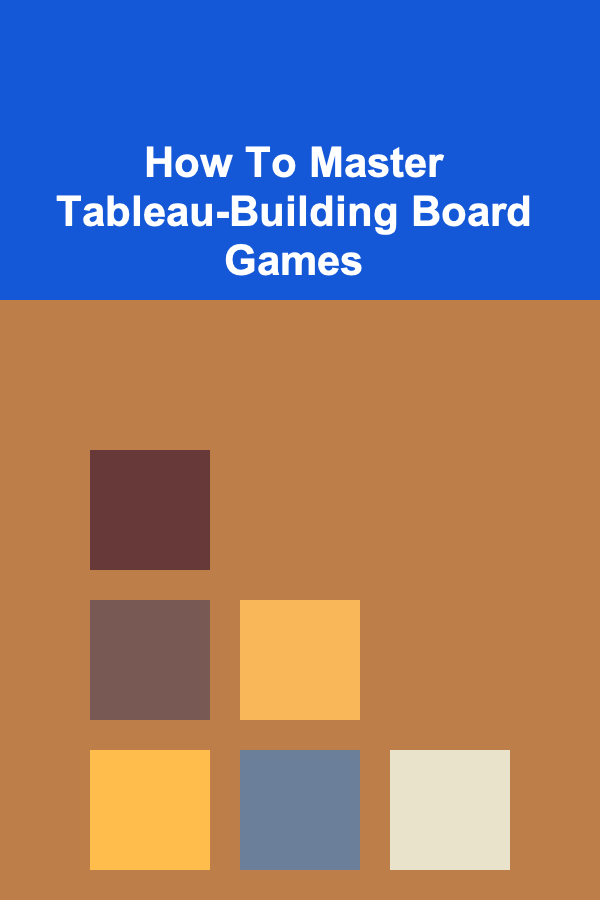
How To Master Tableau-Building Board Games
ebook include PDF & Audio bundle (Micro Guide)
$12.99$9.99
Limited Time Offer! Order within the next:

Tableau-building board games have become a popular genre in the world of tabletop gaming. Whether you are a seasoned player or just starting, mastering these games requires a deep understanding of strategy, mechanics, and the ability to adapt to changing circumstances. In this article, we will delve into what tableau-building games are, the strategies to excel at them, and tips on how to become a master of this unique genre.
What Are Tableau-Building Board Games?
Tableau-building board games are a type of game where players build and manage a personal tableau, or grid of cards, tiles, or other game pieces, throughout the course of the game. The goal is usually to develop synergies or combinations between these pieces that help to score points or achieve specific objectives.
In tableau-building games, players typically start with a limited set of resources, cards, or tiles and must carefully manage and grow their tableau over time. This genre includes games such as Race for the Galaxy , Ark Nova , Wingspan , and Terraforming Mars, among others.
The core idea behind these games is that players have a personal area (the tableau) that they build and optimize, and they must balance competing goals such as resource management, timing, and interaction with other players' strategies. Mastering these games requires not only understanding the rules and mechanics but also developing strategic foresight, adaptability, and a deep understanding of the synergies within the game.
Key Mechanics of Tableau-Building Games
1. Card or Tile Acquisition
In many tableau-building games, players acquire cards or tiles to add to their tableau. These cards represent various actions, abilities, or points of synergy that the player can use to build their strategy. The acquisition phase can involve drafting cards, buying them from a central market, or gaining them through specific in-game actions. Understanding when to acquire certain cards and how to prioritize them is key to success.
2. Tableau Construction
The tableau is the player's personal area where they place cards, tiles, or other game pieces. The arrangement and positioning of these items often have strategic implications. For example, in Terraforming Mars, players must carefully decide where to place cards that affect their income, resources, and terraforming progress. The tableau is where players will see the fruits of their efforts come to life, and it is crucial to design a layout that supports their overall strategy.
3. Synergy and Combo Building
A defining feature of tableau-building games is the emphasis on synergies. These games reward players who can connect the pieces of their tableau in a way that amplifies their abilities. For example, in Wingspan, players might collect birds that provide additional benefits when placed together, such as laying eggs or gaining extra actions. Building these combos requires a keen eye for spotting synergies between cards and understanding how they can be used in tandem to achieve the best possible results.
4. Resource Management
In most tableau-building games, players need to manage various resources such as money, actions, or points. Efficient resource management is crucial because it determines how quickly and effectively a player can expand and optimize their tableau. If players mismanage their resources, they may find themselves unable to take the necessary actions to grow their tableau or achieve victory.
5. Endgame Scoring
Tableau-building games often have a set of criteria for endgame scoring, which can include bonuses for completed sets, points for specific achievements, or rewards for the most optimized tableau. Understanding these endgame conditions and positioning your tableau accordingly is a vital part of mastering these games. It's crucial not only to build an effective tableau during the game but also to prepare for the endgame and the conditions that will lead to victory.
Strategies to Master Tableau-Building Games
1. Plan for Synergies, Not Just Individual Pieces
One of the most important strategies in tableau-building games is to think beyond individual cards or tiles and focus on the synergies between them. Instead of focusing on a card's immediate benefit, think about how it might interact with other cards you can acquire later in the game. For example, if you're playing a game like Race for the Galaxy, you may choose cards that build on each other, providing exponential benefits over time rather than simply focusing on individual point-scoring opportunities.
Look for patterns and combinations that could yield the most value over several turns. This long-term strategic thinking is key to mastering the game.
2. Prioritize Resource Generation
Building a strong resource base early in the game can give you the flexibility to acquire more valuable cards and tiles as the game progresses. In games like Terraforming Mars, resource generation is fundamental because it directly impacts your ability to take actions and expand your tableau. By prioritizing cards that generate resources or provide extra actions, you set yourself up for success in later turns.
Additionally, consider balancing your resource needs. If you focus too much on one type of resource, you may find yourself constrained in other areas. A well-rounded approach to resource management will allow you to adapt to the game's evolving demands.
3. Understand Timing and Card Acquisition
Many tableau-building games feature a market or draft system where players acquire cards. Timing is critical in these games. If you acquire cards too early, you might miss out on better options that become available later in the game. Conversely, if you wait too long, other players might snatch up valuable cards before you have the chance.
Learning the optimal time to acquire specific cards is a skill that comes with experience. You need to balance acquiring cards early to establish a strong foundation while also knowing when to wait for better options. Adapt your strategy based on what is available and how it fits with your overall plan.
4. Adapt to Changing Circumstances
A key aspect of mastering tableau-building games is adaptability. While it's essential to have a long-term strategy, you also need to be able to pivot when things don't go as planned. For example, in a game like Wingspan, the bird cards you need may not always be available, or other players might disrupt your strategy. In such cases, be flexible and open to new approaches.
Sometimes, this means switching your focus to a different type of synergy or optimizing your tableau around different types of cards. Don't be afraid to change direction when the situation calls for it.
5. Anticipate Opponents' Moves
In competitive tableau-building games, you must always be mindful of your opponents' strategies. Understanding their moves and attempting to predict what cards or tiles they will acquire can give you a significant edge. For example, if your opponent is focusing heavily on generating resources, you might want to pursue a strategy that limits their resource generation options.
While these games often feature a personal tableau, the actions of your opponents can have a significant impact on your strategy. Being aware of their moves allows you to adjust your plans accordingly.
6. Leverage Endgame Scoring
As you approach the end of the game, it's crucial to shift your focus toward the endgame scoring conditions. Be mindful of the specific achievements or sets that provide the most points. In games like Terraforming Mars, completing large-scale projects or achieving certain milestones can be the difference between victory and defeat.
Ensure that your tableau is optimized for these scoring conditions. Sometimes, this might involve placing certain cards in your tableau, completing sets of tiles, or taking actions that fulfill specific criteria.
Common Mistakes to Avoid
1. Overcommitting to a Single Strategy
It's easy to fall into the trap of focusing too much on one type of synergy or strategy, especially if it appears to be very powerful early on. However, this can lead to a rigid and inflexible approach that doesn't adapt well to the evolving game state. Be sure to assess your options regularly and be open to switching strategies if needed.
2. Neglecting Resource Management
Resource mismanagement is a common mistake in tableau-building games. Always be aware of how many actions or resources you have left, and try to ensure that your tableau is well-equipped to meet future demands. Running out of resources at a critical moment can cripple your ability to execute your strategy.
3. Ignoring Opponent Strategies
Focusing too much on your own tableau and neglecting your opponents' progress is a mistake. While your personal strategy is paramount, failing to recognize the strategies of other players can leave you vulnerable to disruption. Pay attention to what your opponents are doing and adjust your plans accordingly.
Conclusion
Mastering tableau-building board games requires a blend of strategic thinking, resource management, and adaptability. The beauty of these games lies in their depth and the satisfaction that comes from constructing an optimized tableau that synergizes with your overall strategy. By focusing on synergies, timing, resource management, and endgame conditions, you can position yourself for victory.
As you play more tableau-building games, you'll develop a deeper understanding of the mechanics and nuances that make these games so enjoyable and challenging. With practice, you'll become a master of the genre, capable of adapting to any situation and outwitting your opponents at every turn.

How to Improve Your Credit Score Without Taking on New Debt
Read More
How to Organize Your Garage for Maximum Storage and Functionality
Read More
How to Scale Your Small Business by Integrating Process Automation
Read More
Top 10 Discounted Entertainment Options for Budget-Friendly Fun
Read More
Understanding the Role of Coaches in Esports
Read More
Financing Your Renewable Energy Project: A Comprehensive Guide
Read MoreOther Products

How to Improve Your Credit Score Without Taking on New Debt
Read More
How to Organize Your Garage for Maximum Storage and Functionality
Read More
How to Scale Your Small Business by Integrating Process Automation
Read More
Top 10 Discounted Entertainment Options for Budget-Friendly Fun
Read More
Understanding the Role of Coaches in Esports
Read More